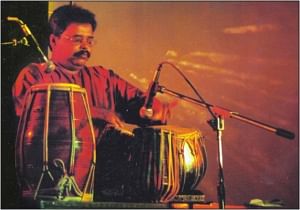An institute for the acoustic instrumentalists is a must --Chandan Dutta
Novera Deepita
Firmly etched in the memory of tabla player Chandan Dutta is his first musical encounter with sarod maestro Ustad Ali Akbar Khan in Dhaka. The time: the early 1980s when Kanthoshilpi Shangstha (Singers' association) arranged a reception programme for the renowned Khan in Dhaka. Reminisces Chandan smilingly, 'I was present among the audience in that programme. After the reception, Ali Akbar Khan said that it would not be right if he didn't listen to the songs of the artistes present at the get together. Everybody agreed, but few singers dared to perform before the sarod maestro.However, when everybody was ready to perform, they began to look for a tabla player. Some among the artistes knew me and told me to play with eminent artiste Subir Nandi. I was just a beginner then but I could not refuse to play. With a thumping heart I played in front of the great artiste, I had met for the first time. In my nervousness, I was unaware of what I was playing but after the show everybody appreciated my performance. It was an unforgettable event.' As a busy tabla player Chandan has gained wide acceptance in the country and has performed in about 500 stage shows so far. He has worked with popular and eminent artistes like Sabina Yasmeen, Rafiqul Alam, Syed Abdul Haadi and Abida Sultana. He has also played with international artistes like Mehdi Hassan, Manna Dey, Anup Jalota, Bob Livingstone and George Millar. Chandan admires the style, rhythm and sound effects of Zakir Hussain's tabla . Chandan also follows the style of the Punjab Gharana that Zakir Hussain plays. At home, he appreciates Debu Chowdhury as a veteran tabla player while he terms Syed Meher Hossain as a promising player. In the late 1980s, along with other four musicians, he formed an instrumental band called Panchapandab. Explaining the reasoning behind the formation of this band, Chandan says, 'Previously a singer used to be accompanied with a guitar, accordion and tabla. But when the accordion was replaced by keyboards and bass guitar and drums were added as background instruments, skilled musicians were required to play these new instruments.' The group's teamwork was far more professional than that of other players. As Chandan states, 'Previously the players used to do the follow up music for the singers. There were rarely any proper rehearsals. It was Panchapandab who started the practice of doing planned rehearsals with the artiste with full instrumental back ups.' At present Chandan is the coordinator of the group and also involved with Shilpakala Academy as a musician. He worked as the assistant of eminent music director Shatya Shaha for five long years and played in many of his playbacks. Chandan is not willing to say that the tabla is neglected in Bangladesh. To quote him, 'There are two different categories of playing instruments like solo performance and accompanying a singer.' Chandan chose the category of accompanying the artistes. This route, he thinks, is a way of making music more attractive. According to Chandan, 'It is very risky in our country to take tabla playing as a profession'. Chandan regrets that there is no proper institute for the instrumentalists. He fears that there will be a scarcity of acoustic instrumentalists in the country within ten years. Chandan emphasised on establishing a government-recognised institute for the acoustic instrument players immediately. He remarks, 'Otherwise the traditional instruments like shehnai, flute, sitar, sarod and dotara will be extinct from the world soon.'
|

Chandan Dutta: A brilliant tabla player |